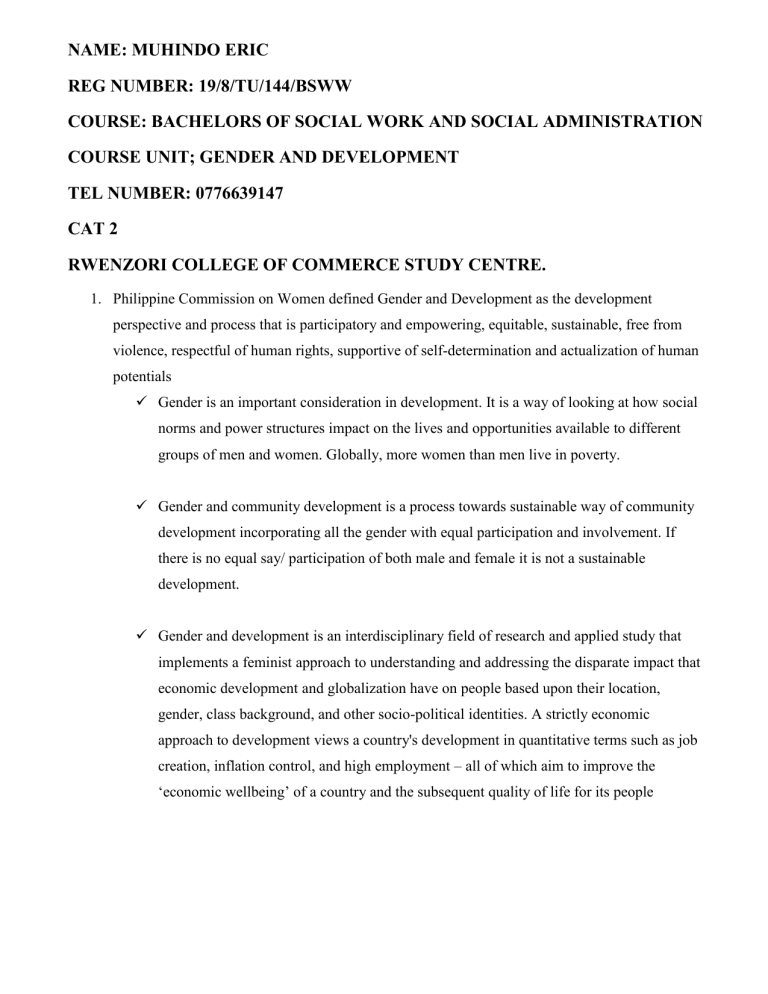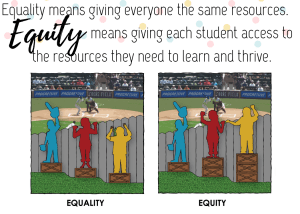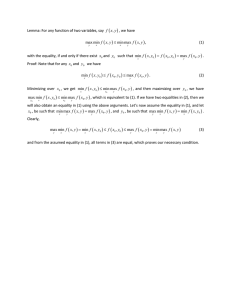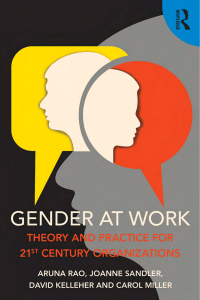
NAME: MUHINDO ERIC REG NUMBER: 19/8/TU/144/BSWW COURSE: BACHELORS OF SOCIAL WORK AND SOCIAL ADMINISTRATION COURSE UNIT; GENDER AND DEVELOPMENT TEL NUMBER: 0776639147 CAT 2 RWENZORI COLLEGE OF COMMERCE STUDY CENTRE. 1. Philippine Commission on Women defined Gender and Development as the development perspective and process that is participatory and empowering, equitable, sustainable, free from violence, respectful of human rights, supportive of self-determination and actualization of human potentials Gender is an important consideration in development. It is a way of looking at how social norms and power structures impact on the lives and opportunities available to different groups of men and women. Globally, more women than men live in poverty. Gender and community development is a process towards sustainable way of community development incorporating all the gender with equal participation and involvement. If there is no equal say/ participation of both male and female it is not a sustainable development. Gender and development is an interdisciplinary field of research and applied study that implements a feminist approach to understanding and addressing the disparate impact that economic development and globalization have on people based upon their location, gender, class background, and other socio-political identities. A strictly economic approach to development views a country's development in quantitative terms such as job creation, inflation control, and high employment – all of which aim to improve the ‘economic wellbeing’ of a country and the subsequent quality of life for its people Gender and development considers many of these same factors; however, gender and development emphasizes efforts towards understanding how multifaceted these issues are in the entangled context of culture, government, and globalization. The Gender and Development (GAD) approach focuses on the socially constructed differences between men and women, the need to challenge existing gender roles and relations, and the creation and effects of class differences on development. The gender perspective in development manifests the efforts towards ensuring equitable distribution of fruits of development. The idea of gender as a category has emerged as an outcome of the prevalent disparity and discrimination between men and women in almost all societies. Study of development and gender enables us to quantify the results of development efforts and also reflects the relative share of each segment of society which helps in devising sector specific policies and goals. 2. Relevance of studying gender and development Gender is an important consideration in development. It is a way of looking at how social norms and power structures impact on the lives and opportunities available to different groups of men and women. Gender and Development seeks to equalize the status and condition of and relations between women and men by influencing the process and output of policy. making, planning, budgeting, implementation and monitoring, and evaluation so that they would deliberately address the gender issues and concerns affecting the full development of women. This enables us to examine and challenge social norms around what it means to be a woman or man in society, and to pursue justice and equality for all, which should be fundamental facets of development. Gender Studies has real-world consequences Gender Studies is a complex subject, and leading academics like Judith Butler and Julie Kristeva are among some of the greatest intellectuals of the last 20th century. Their texts re-examine the very foundations of psychoanalytical theory, Western philosophy, and the objectivity of scientific research. Their arguments are incredibly nuanced and can take years of academic study before being fully appreciated. As such, a cursory reading can lead to the incorrect conclusion that such ideas are purely theoretical, but it's important to remember that they have real-world consequences. Studying gender and development leads to better legal protections Under the law, women aren’t well-protected from domestic sexual and economic violence. Both of these types of violence affect a woman’s safety and freedom. Increasing women’s legal rights keeps them safe and able to build productive happy lives. It also leads to better racial equality Gender equality and race equality are closely linked. Within issues like the gender pay gap, race plays a big role. White and Asian women earn more than black, Hispanic, and native women. In the United States, black women face a higher risk of death from pregnancy-related causes. When gender equality considers race as a factor, it improves race equality at the same time.



